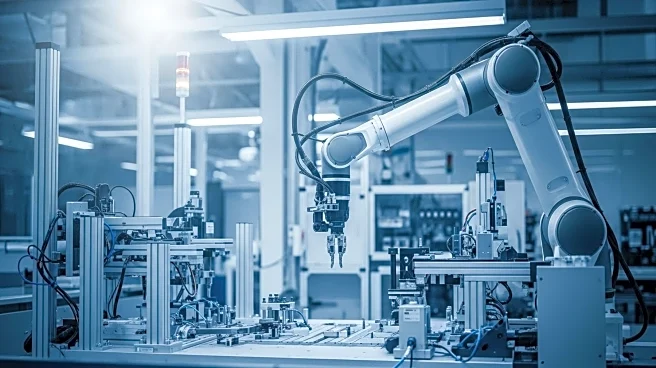What is the story about?
What's Happening?
Alexander Daniels Global (ADG), a recruitment agency specializing in Industry 4.0, is tackling the persistent shortage of skilled workers in the U.S. manufacturing sector. The agency is focusing on filling entry-level positions such as machine operators and technicians, which are crucial for the additive manufacturing (AM) industry. Nick Pearce, co-founder and CEO of ADG, highlights the challenges in recruiting for these roles due to a lack of scalable staffing infrastructure and underinvestment in vocational training. Pearce emphasizes the need for hands-on training and collaboration between companies, hiring agencies, and training programs to address the workforce gap. The agency is exploring models like 'Recruit-Train-Deploy' to efficiently place trained workers in relevant positions.
Why It's Important?
The shortage of skilled workers in the U.S. manufacturing sector poses a significant challenge to the country's economic growth and efforts to reshore manufacturing supply chains. With nearly 500,000 open manufacturing jobs, the inability to fill these positions could hinder the industry's expansion and innovation. ADG's approach to recruitment and training could serve as a model for other sectors facing similar workforce challenges. By aligning the interests of trainers, recruiters, and employers, ADG aims to transform workforce development from a weakness into a competitive advantage for the AM industry. This initiative could lead to increased job opportunities and economic stability, particularly for entry-level workers.
What's Next?
ADG plans to continue developing its recruitment strategies and training programs to address the manufacturing workforce shortage. The agency is advocating for increased public policy support to enhance vocational training and workforce development. Collaboration with major employers in sectors like aerospace and defense is expected to expand, potentially leading to more comprehensive training programs. The success of these initiatives could influence other industries to adopt similar models, thereby improving overall employment rates and economic resilience. ADG's efforts may also prompt government involvement to facilitate the scaling of training programs and support the reshoring of manufacturing jobs.
Beyond the Headlines
The focus on vocational training and hands-on experience in the manufacturing sector highlights a broader shift in educational priorities. As traditional college degrees become less essential for certain careers, vocational training offers a practical alternative that aligns with industry needs. This shift could lead to a reevaluation of educational policies and funding, emphasizing skills-based learning over academic credentials. Additionally, the integration of AI and advanced technologies in manufacturing presents opportunities for workers to develop new skills and adapt to evolving job requirements, potentially mitigating the impact of automation on employment.
















